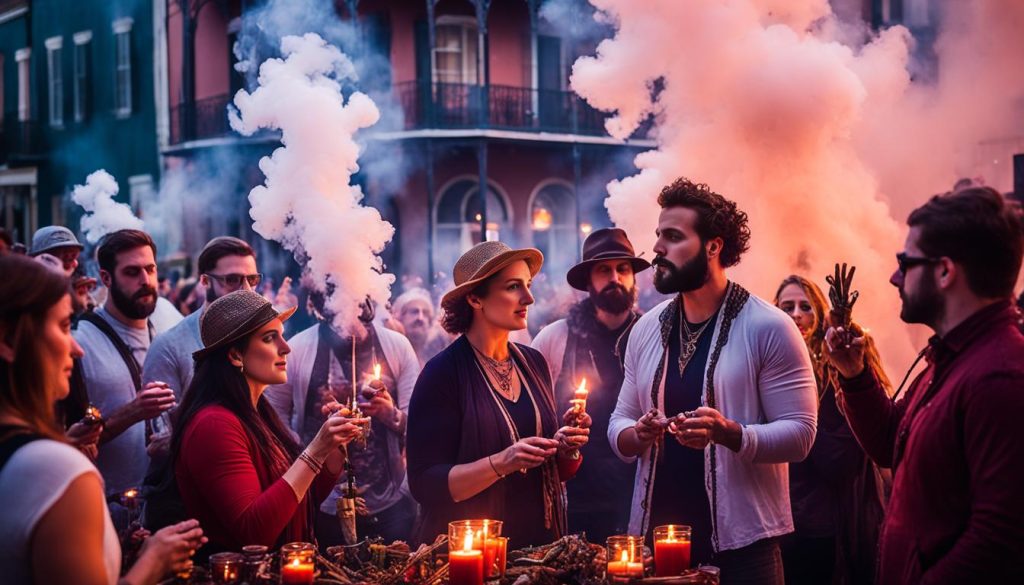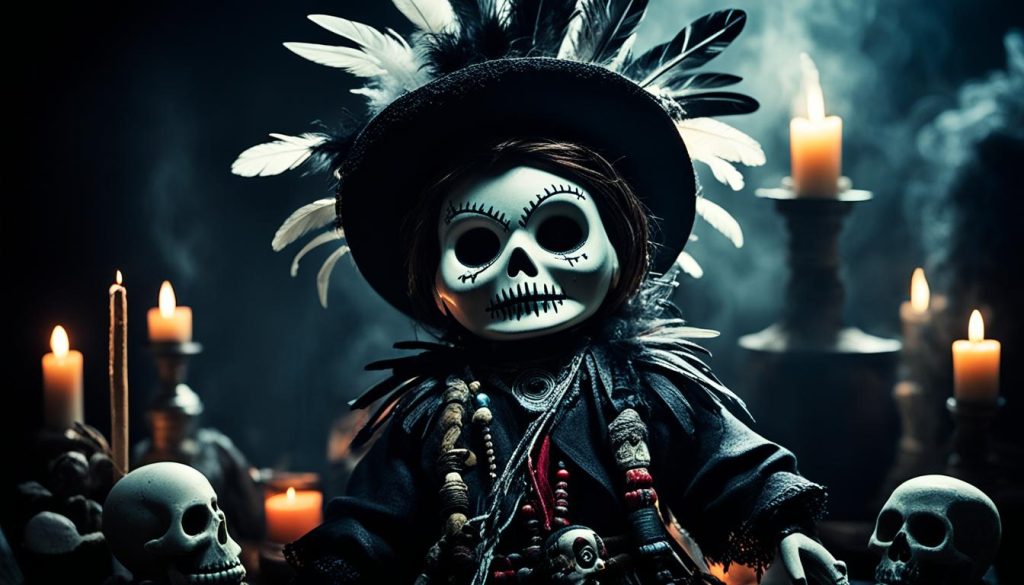Have you ever wondered why people are drawn to the mystical allure of voodoo? Voodoo, also known as Vodou, is a religious practice with ancient roots and deep cultural significance. It continues to be practiced by millions of people worldwide, making it an intriguing and captivating subject to explore.
Voodoo practices encompass a wide range of rituals and beliefs that vary across different regions. But what drives individuals to engage in voodoo practices? The answers are as diverse as the practitioners themselves.
For many, the cultural significance of voodoo plays a major role in their interest and devotion. Voodoo is not merely a religion; it is a way of life. It serves as a connection to one’s ancestors, a source of spiritual guidance, and a means of finding healing. The practices of voodoo can be deeply rooted in personal and collective identity, offering a sense of belonging and purpose.
The mystical allure of voodoo also holds a strong appeal. The belief in spirits, their connection to the divine, and their ability to influence earthly matters creates an air of mystery and fascination. Voodoo ceremonies, often accompanied by dancing, drumming, and possession by spirits, can create a trance-like state that allows participants to experience a profound connection with the spiritual realm.
It is important to note that voodoo is often misconstrued and misrepresented in Western media. Hollywood movies and popular books have perpetuated stereotypes and created a negative stigma around voodoo, associating it with black magic and evil intentions. However, in its authentic form, voodoo is far from these misconceptions.
Through this article series, we will delve into the mysteries of voodoo, uncovering its origins, exploring its practices in different regions like New Orleans and Haiti, and shedding light on the cultural diversity and spirituality that it encompasses.
The Origins of Voodoo in New Orleans
Voodoo has a captivating history in the vibrant city of New Orleans. Its origins can be traced back to the enslaved West Africans who brought their religious practices and beliefs to the region. These African traditions merged with the Catholicism of the French and Spanish colonizers, resulting in a unique blend known as Voodoo-Catholicism.
During the 1800s, voodoo played a significant role in the lives of the free people of color in New Orleans. Voodoo queens and kings emerged as influential figures, both spiritually and politically. One of the most celebrated voodoo personalities in the city’s history is Marie Laveau. Renowned as a voodoo queen, she commanded immense respect and was highly sought after for her spiritual guidance.
Today, voodoo practices continue to thrive in New Orleans. People engage in a variety of rituals and ceremonies, including readings, spiritual baths, prayer, and personalized rituals. The city even houses the renowned New Orleans Voodoo Museum, a hub where visitors can explore the rich history and rituals associated with voodoo in the area.
Marie Laveau: The Voodoo Queen of New Orleans
Marie Laveau, often referred to as the “Voodoo Queen of New Orleans,” was a central figure in the city’s voodoo community during the 19th century. She was known for her powerful spiritual abilities and her influence as a practitioner of voodoo. Marie Laveau’s reputation spread far and wide, attracting people seeking her guidance, wisdom, and help.
As a voodoo queen, Marie Laveau combined her knowledge of African spiritual traditions with Catholicism, creating a unique blend that resonated with the diverse population of New Orleans. She conducted ceremonies, performed rituals, and studied the mystical arts, gaining a prominent position within the voodoo community.

Marie Laveau’s legacy continues to captivate and intrigue visitors to New Orleans. Her impact on the culture and spirituality of the city can still be felt today, as voodoo remains an essential part of New Orleans’ rich tapestry of traditions.
The Mysteries of Voodoo in Haiti
Voodoo, also known as Vodou, holds a deep-rooted place in the culture and spirituality of Haiti. It is estimated that voodoo is practiced by 100% of the population in Haiti, coexisting with Catholicism and Protestantism. Voodoo, or Vodou as it is referred to in Haiti, is not just a religion but a way of life for many Haitians.
Vodou ceremonies are an integral part of Haitian voodoo beliefs, where practitioners gather to make contact with the Loa spirits. These spirits are believed to have different functions in the universe, ranging from guidance and protection to healing and fertility. During these ceremonies, sacrifices are made to appease the spirits, and participants seek advice and help for various aspects of their lives.
Haitian voodoo ceremonies are known for their energetic dancing, drumming, and the state of possession that participants may experience. Vodou practitioners believe that through possession, the Loa spirits can directly communicate and interact with individuals, offering wisdom and solutions to their problems.
One prominent figure in Haitian voodoo is Max Gesner Beauvoir, who served as the supreme chief of Vodou in Haiti. Beauvoir played a significant role in dispelling misconceptions about the religion and promoting its cultural and spiritual significance. He emphasized that voodoo is not about black magic or evil, but rather a way to connect with the divine and seek spiritual guidance.
Overall, voodoo in Haiti is a complex and deeply ingrained tradition that provides a unique insight into the rich cultural and spiritual heritage of the Haitian people.
The Misrepresentation of Voodoo in Western Media
Voodoo has often been misrepresented and misunderstood in Western media, particularly in Hollywood movies and popular books. These portrayals have perpetuated stereotypes of voodoo as black magic, devil worship, and the use of voodoo dolls for harm. In reality, these elements do not exist in the authentic voodoo practices that originated in Benin, West Africa.
The misrepresentation of voodoo in popular culture has created a negative stigma around the religion and has contributed to the fear and misconceptions associated with it. Hollywood’s portrayal of voodoo has sensationalized and distorted the true nature of the religion, reinforcing harmful stereotypes that misrepresent its beliefs and practices.
It is important to separate the Hollywood portrayal of voodoo from the genuine religious and cultural practices of voodoo. Voodoo is a rich and complex religion with deep cultural roots and a focus on ancestral worship, healing, and spiritual connection. The misrepresentation of voodoo has not only harmed the reputation of the religion but has also perpetuated harmful stereotypes that further marginalize communities that practice voodoo.

These misrepresentations have had real-world consequences, leading to discrimination and prejudice against voodoo practitioners. It is crucial to educate ourselves and others about the authentic beliefs and practices of voodoo, dispelling the misconceptions that have been perpetuated by media portrayals.
By understanding the truth about voodoo and challenging the misrepresentations, we can work towards promoting cultural understanding, respect, and appreciation for the diverse beliefs and practices of different religions. It is important to move away from the sensationalized stereotypes and embrace a more accurate and nuanced understanding of voodoo in popular culture.
Voodoo as a Response to Oppression and Resilience
Voodoo has deep roots in the history of Haiti and is often regarded as a powerful response to the oppression and hardships experienced by enslaved Africans. During the Haitian revolution in 1791, Vodou, the Haitian variant of voodoo, played a vital role in inspiring and empowering the enslaved people to fight for their freedom.
One pivotal moment in the revolution was the ceremony at Bois Caïman, where a pig was sacrificed and revolutionaries made a pact to kill white settlers. This event symbolized a turning point and marked the beginning of the revolution that eventually led to the establishment of the first black republic in the world.
Vodou became a religion that embodied rebellion and freedom, providing a source of strength and resilience for the Haitian people. It served as a unifying force, affirming their humanity and offering a deep connection to their ancestors, culture, and spiritual heritage. Vodou became a powerful tool for resistance, as it symbolized a collective identity and strengthened the resolve of the enslaved people to fight against oppression.
Centuries later, Vodou continues to play a significant role in Haitian identity and the collective memory of the Haitian people. It serves as a source of spiritual and emotional strength, providing solace, healing, and guidance. Vodou rituals, with their energetic dancing, drumming, and possession by spirits, create a sense of unity and connection among the community.
Vodou: A Source of Strength and Resilience
Vodou offers a sanctuary where Haitians can find solace and draw upon their inner strength to face various challenges and adversities. Through ceremonial practices, individuals can seek guidance from the spirits, find healing for themselves and their communities, and reconnect with their ancestral roots. Vodou acts as a powerful source of resilience, nurturing the spirit and providing a platform for social cohesion.
The Haitian revolution and the subsequent establishment of the black republic continue to inspire and shape the collective spirit of the Haitian people. Vodou, as an integral part of their cultural and spiritual identity, serves as a reminder of their triumph over oppression and the resilience of their ancestors. It is a testament to the power of faith, community, and the indomitable human spirit.
Through voodoo, Haitians have found solace, strength, and a means of resistance against the forces of oppression. It stands as a powerful symbol of their resilience and determination to reclaim their freedom and preserve their cultural heritage. Vodou is not just a religious practice; it is an embodiment of the Haitian identity and a testament to the enduring human spirit in the face of adversity.
Conclusion
Voodoo is a fascinating and multifaceted religious practice that holds deep cultural and historical significance. It is crucial to separate the myths and misconceptions surrounding voodoo from the authentic beliefs and practices of its followers. Voodoo is not synonymous with black magic or evil, but rather a means for individuals to connect with spirits, seek guidance, and find healing.
The practice of voodoo varies across different regions, such as Haiti and New Orleans, showcasing the cultural diversity and unique expressions of spirituality within the voodoo tradition. From the vibrant voodoo ceremonies in Haiti, where participants energetically dance and drum to connect with Loa spirits, to the rich blend of voodoo and Catholicism in New Orleans, voodoo reflects the cultural identities and spiritual beliefs of its practitioners.
By understanding the true nature of voodoo, we gain a profound appreciation for its cultural significance and the vital role it plays in the lives of its followers. Voodoo serves as a source of strength, resilience, and affirmation of humanity, particularly in the context of oppression and historical struggles. It is a celebration of cultural diversity and spirituality, providing individuals with a pathway to connect with their ancestors, navigate life’s challenges, and find solace in their shared beliefs and practices.